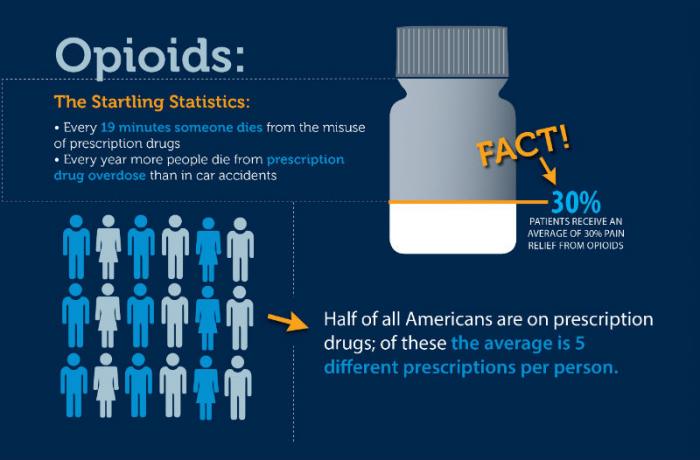We ask you, urgently: don't scroll past this
Dear readers, Catholic Online was de-platformed by Shopify for our pro-life beliefs. They shut down our Catholic Online, Catholic Online School, Prayer Candles, and Catholic Online Learning Resources essential faith tools serving over 1.4 million students and millions of families worldwide. Our founders, now in their 70's, just gave their entire life savings to protect this mission. But fewer than 2% of readers donate. If everyone gave just $5, the cost of a coffee, we could rebuild stronger and keep Catholic education free for all. Stand with us in faith. Thank you.Help Now >
Cherokee Nation sues drug distributors while CDC claims opioid deaths are underreported
FREE Catholic Classes
As the CDC admits the opioid epidemic may be worse than originally believed, the Cherokee Nation files a lawsuit against pharmacies and drug distributors for not taking the responsibility to curb the spread of addiction.

The opioid epidemic continues to wreak havoc across the United States.
Highlights
CALIFORNIA NETWORK (https://www.youtube.com/c/californianetwork)
4/25/2017 (8 years ago)
Published in U.S.
Keywords: Opiods, crisis, U.S., overdoses, Cherokee, pharmacies
LOS ANGELES, CA (Catholic Online) - On March 15, 2017, the CDC updated its website to offer a guideline for prescribing opioids for chronic pain.
The CDC suggests the best way to avoid opioid abuse and dependency is to develop better prescription guidelines for patients over 18-years-old in primary care settings.
These recommendations focus on turning to opioids only for those who suffer chronic pain, which lasts over 3 months or longer than the normal time it takes tissues to heal, those who receive cancer treatment, palliative care and those who receive end-of-life care.
There are several reasons for the newer guidelines, one of which was the massive spread of opioid abusers, who have been overdosing at alarming rates.
Another reason is the side-effects of the drugs, which includes an impaired immune system, leaving abusers open to a greater risk of infection and the change to overdose.
Due to the lowered immune system in opioid users, the CDC believes the number of opioid-related deaths has been underestimated.
A new report states: "An EIS investigation of opioid toxicity deaths using Minnesota's unexplained-death surveillance system found that deaths were not documented in opioid death surveillance because an infectious disease was listed on the death certificate. The contributions of opioid toxicity, infectious disease, and their interactions that result in death may inform future prevention efforts."
Another area of the website explains the abuse of opioids and heroin has resulted in a rise of hepatitis B and hepatitis C.
People are transmitting the diseases by:
- sharing needles and syringes
- sharing cookers, cotton, water, ties, alcohol swabs and other equipment used to prepare and inject drugs
- reusing equipment used to inject drugs and
- getting accidental needle sticks from dirty needles and syringes that are not discarded properly
A great question concerning the opioid epidemic is how are drug abusers getting these drugs?
Some blame doctors, who prescribe opioids when other, safer, drugs would be better for the patient. Other sources cite people with chronic pain who fill their prescriptions then recover and sell the remaining pills.

(NevadaPain)
The easy access for opioids has led to a dramatic increase in addictions across the country, leading the Cherokee Nation to file a lawsuit suing pharmacies and drug dispensers for refusing to secure and monitor opioids "as they travel through commerce, protecting them from theft, and refusing to fulfill suspicious or unusual orders by downstream pharmacies, doctors, or patients."
The Cherokee Nation claims the distributors are responsible for the opioid epidemic, which has affected their tribes and is "more deadly than heroin."
They cite reports from the National Institutes of Health to reveal prescription opioids killed 22,598 people in the U.S. in 2015, compared to 12,989 deaths from heroin.
The group goes on to explain: "In 2016, the U.S. Surgeon General visited with the tribal representatives in Oklahoma, where most Cherokee Nation citizens reside, and declared the 'prescription opioid epidemic that is sweeping across the U.S. has hit Indian country particularly hard.'"
This is unacceptable to the Cherokee Nation, therefore they are suing companies for "knowingly or negligently" distributing and dispensing opioid drugs within the Cherokee Nation.
Here is the list of the companies they are suing:
- McKesson Corportation
- Cardinal Health, Inc.
- AmerisourceBergen
- CVS Health
- Walgreens Boots Alliance, Inc.
- Wal-Mart Stores, Inc.
According to the U.S. Department of Justice, in January, McKesson Corporation was forced to pay a record $150 million settlement for failing to report suspicious orders of opioids.
In 2008, the corporation paid $13.25 million in civil penalties for similar violations.
As for Cardinal Health, Inc., they were forced to pay $34 million in a settlement for failing to report suspicious orders to the DEA. Separately, Cardinal Health paid an additional $10 million to resolve allegations that its subsidiary, Kinray, Inc., failed to report suspicious orders in its service area.
Both occurred in December 2016.
AmerisourceBergen and Cardinal Health both settled a lawsuit in January, where Cardinal Health agreed to pay $20 million and AmerisourceBergen paid $16 million.
Each distributor denied any wrongdoing or allegation of liability for accusations of shipping out more opioids than necessary.
With their suspicious backgrounds, it is likely the Cherokee Nation's case will move forward.
According to CNN, Richard Fields, special counsel to the attorney general of the Cherokee Nation, stated: "When you look at the history of what the (U.S. Drug Enforcement Administration) has been prosecuting, you realize the extraordinary amounts of drugs that are being pumped into our society. We just want to see these companies change their behavior, follow the law and really do what's right -- not just for the Cherokee Nation but for our country."
---
The California Network is the Next Wave in delivery of information and entertainment on pop culture, social trends, lifestyle, entertainment, news, politics and economics. We are hyper-focused on one audience, YOU, the connected generation. JOIN US AS WE REDEFINE AND REVOLUTIONIZE THE EVER-CHANGING MEDIA LANDSCAPE.
Join the Movement
When you sign up below, you don't just join an email list - you're joining an entire movement for Free world class Catholic education.
An Urgent Message from Sister Sara – Please Watch
- Easter / Lent
- 5 Lenten Prayers
- Ash Wednesday
- 7 Morning Prayers
- Mysteries of the Rosary
- Litany of the Bl. Virgin Mary
- Popular Saints
- Popular Prayers
- Female Saints
- Saint Feast Days by Month
- Stations of the Cross
- St. Francis of Assisi
- St. Michael the Archangel
- The Apostles' Creed
- Unfailing Prayer to St. Anthony
- Pray the Rosary
![]()
Copyright 2026 Catholic Online. All materials contained on this site, whether written, audible or visual are the exclusive property of Catholic Online and are protected under U.S. and International copyright laws, © Copyright 2026 Catholic Online. Any unauthorized use, without prior written consent of Catholic Online is strictly forbidden and prohibited.
Catholic Online is a Project of Your Catholic Voice Foundation, a Not-for-Profit Corporation. Your Catholic Voice Foundation has been granted a recognition of tax exemption under Section 501(c)(3) of the Internal Revenue Code. Federal Tax Identification Number: 81-0596847. Your gift is tax-deductible as allowed by law.







